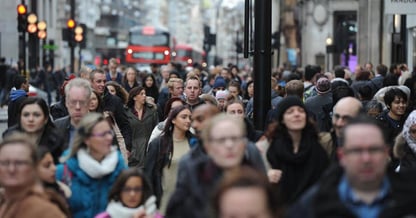
Getting Your Team On Board with Digital Transportation
Embracing digital transportation can be difficult for some, but the benefits for Train Operating Companies (TOCs) are clear. If you’re struggling to implement...
Read more
5 minute read | 02/06/2020

COVID-19’s impact on everything has been colossal and, of course, events have been affected hugely by this. While there’s no such thing as ‘the perfect event’ when normality resumes, there’ll be newfound event expectations that we’ll need to accomplish.
From staying informed, to implementing an intelligent WiFi solution that provides valuable data, here’s how to make an event successful post-pandemic.
The event industry remains one of the hardest struck by the coronavirus crisis. A lot of uncertainty remains on the future of meetings and events. In fact, the events landscape might be forever changed as we know it.
While online events might suffice for now, many are eager to experience the normalcy of face-to-face events as soon as it's safe to do so. However, it’s unclear when that might be and the most pressing question on event planners' minds is what will events look like once the lockdown has been lifted?
With guidelines being updated daily, it’s difficult to provide evergreen advice. Staying informed about COVID-19’s impact on various parts of the world is vital to ensuring the safety of you, your team and attendees. Here are some considerations for your event post-pandemic.
For updated information, check these resources regularly for the latest:
The new normal for events after this will be a challenging one. There are specific conditions that need to be met before events can continue. However, here are some considerations for when it’s safe to do so.
Beyond COVID-19 considerations, the very first step when planning your event is to define tangible goals and objectives. With success highly subjective, it’s important to establish what it takes to achieve that early on.
If you know your key goals before planning, you can ensure every part of your event is tailored for success. Are you trying to raise awareness for a cause, gather industry experts or collect a predetermined amount of donations for your next project?
Whatever the reason for planning an event, it should be clearly communicated to anyone who’ll attend on behalf of your business. Make sure to set SMART goals, which are:
Defining these five elements will help to make your goals easier to define. It also means everybody involved during the initial planning stages knows what to expect and more importantly, what’s expected from them.
Whatever the event or conference, it’s vital that your venue provides a reliable and free WiFi connection. It’s just something that the modern-day user expects, especially after the COVID-19 dust settles as we’ll all be comfortable with online webinars, conferences and training.
A successful event is in total sync with its audience’s expectations and technology is a major component. Gone are the days when simply hosting a well-attended event did the trick. To truly expand your business in the minds and hearts of your audience, you need to bring your engagement arsenal to the table.
Some conferences and venues settle for poor WiFi, which frustrates guests and takes the focus away from the key message of the event.
Delegates will want to check in with their work emails during the day and they may also want to comment on social media about the event, so it’s essential that your WiFi enables them to do both of these things seamlessly.
It’s likely that we’ll see outdoor events a lot sooner than enclosed venues, the right WiFi provider will be well-equipped to handle this shift. With exterior access points and any accompanying hardware usually at risk of extreme weather conditions - they should guarantee equipment is robust enough that coverage and connectivity isn’t negatively impacted during any kind of weather.
As more businesses discourage handling cash to avoid risk, we shift towards a contactless, cashless society. It’s proved beneficial during these uncertain times, so much so the contactless card payment limit has been raised. It’s unlikely we’ll move away from this convenience post-pandemic. To be able to use this payment method at your event’s venue, you need to make sure there’s a reliable WiFi connection.
The last thing you want is disgruntled vendors that are unable to sell their goods because their card machines can’t access the internet. Choose the right WiFi supplier and your vendors will have no problems processing contactless payments.
With social distancing needing to be maintained at all times, you should consider the importance of analytics and make sure that any prospective WiFi service provider is equipped to collect visitor data. This information is incredibly valuable, giving the venue insight into the behaviour of event attendees and how it can be improved upon.
This insight can include knowing where high-volume areas are so that you can navigate traffic better and optimising where sanitation stations can be. Some providers will collate this data for the venue but then try and sell it back to them. Choose one that gives ownership of the data to the venue, allowing you to improve visitor experience without increasing costs.
By choosing the right WiFi supplier to work with, the path to normality can be made a little bit easier. Choose poorly and you’ll be left with disgruntled visitors and negative publicity. During this unprecedented time, you should work with a WiFi supplier who will be on hand to remedy any situation. They'll ensure you have a platform in place that will act as the foundation for a successful event.
In addition to uninterrupted access to the internet and coverage throughout the whole venue, you need a platform that offers targeted messaging, visitor analytics and content filtering. See how you can enhance your event with WiFi now by downloading our guide. It offers more tips on improving your WiFi network and shows how an experienced supplier can help.
Download your free copy of the guide now using the link below.
Rebecca is the Marketing Director. She's worked for SPARK TSL since 2012. She is responsible for high level marketing strategy focusing on lead generation and aiding the vision of the business; to ensure that no patient has to pay for entertainment.
More articles by the author

Embracing digital transportation can be difficult for some, but the benefits for Train Operating Companies (TOCs) are clear. If you’re struggling to implement...
Read more

43 retailers ceased trading last year. This impacted 2,594 stores on the high street and put around 40,000 people either at risk of losing their job or without...
Read more

WiFi changed the face of many industries, including the retail sector. Despite this, some businesses believe providing free WiFi isn’t worth the expense and...
Read more